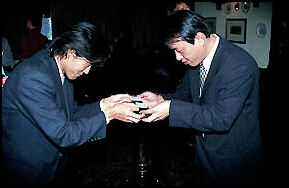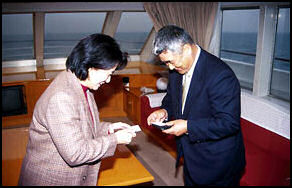BUSINESS VIRTUES IN JAPAN
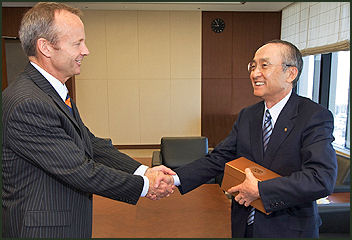
Former President of Toyota
greets Canadian Prime Minister In Japan, relations not rules have traditionally been what mattered most, with personal relations sometimes having precedence over business concerns. Japanese tend to look down on the American way of putting the bottom line before human beings and their habit of solving problem through litigation rather than personal contact. An American professor attributes the Japanese's success not to the fact they work harder but that they work together. Team work is emphasized over individual enterprise.
Efficiency and preparedness are greatly valued. Sometimes Japanese businessmen look down on American businesses and businessmen for being unprepared and lacking knowledge of Japanese and international methods of doing business.
Laying off workers and emphasizing efficiency over courtesy goes against the Japanese concept of politeness. It is considered rude to complain directly to a superior. The Japanese generally try to use more subtle ways to get their messages across.
“Sampo-yoshi” is a business principal of traditional Japanese merchants that stress the importance of satisfying all parties in a transaction. In the late 2000s it made a comeback as Japanese businessmen were becoming increasing disillusion with the results of dog-eat-dog market economics. “Sampo-yoshi” literally means “trinity of bliss” — a reference to making the buyer, the seller and the general public happy.
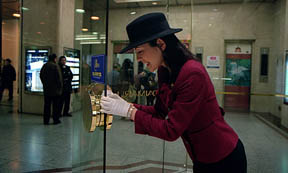
bowing Seniority has traditionally been regarded as more important thaN achievement or skill and individuals are held personally responsible for mistakes they make within a company. According to Japan’s finance laws, when a company goes bankrupt, individuals who own the company are deemed responsible and they go bankrupt too.
Japanese workers often don’t leave the office immediately at five. They often hang around until after their boss leaves and are expected to go out, drink and socialize with their coworkers. Some Japanese work late for appearance sake. Other do so to get work done. Ass kissing and looking busy are condoned behavior. In their offices, Japanese tend to goof off and joke around as much as American workers. Many Japanese feel that Americans don’t work very hard. Americans that are viewed as working hard in Japan are complimented as being Japanese-like
In a survey in 1970s, 30 percent of Japanese said that working with people they like was the their most important job objective while only 14 percent of American did and 87 percent of Japanese respondents preferred a boss who was personal but demanded loyalty above company rules over one who was impersonal but rule-abiding whereas only 50 percent of American made the same choice.
Websites and Resources
exchanging business cards Good Websites and Sources: Culture- at-Work culture-at-work.com ; Executive Planet executiveplanet.com ;Tips on Doing Business in Japan cyborlink.com ; More Tips on Doing Business in Japan euro-technology.com ; Kwintessential kwintessential.co.uk
Japanese Customs and Manners: Japan Guide japan-guide.com ; Japanese Manners and Etiquette thejapanfaq.com/FAQ-Manners ; Ten Japanese Customs matadorabroad.com ; Eating and Drinking Customs: Essential Japanese Guide essential-japan-guide.com ; Sushi Etiquette homepage3.nifty.com ; Right Way to Eat Sushi snippets.com ;Drinking Customs japanvisitor.com
Links in this Website: ECONOMICS AND DAILY LIFE IN JAPAN Factsanddetails.com/Japan ; JAPANESE CUSTOMS Factsanddetails.com/Japan ; SOCIAL CUSTOMS IN JAPAN Factsanddetails.com/Japan ; JAPANESE HOME, EATING AND DRINKING CUSTOMS Factsanddetails.com/Japan ; JAPANESE PERSONALITY AND CHARACTER Factsanddetails.com/Japan ; JAPANESE POLITENESS AND INDIRECTNESS Factsanddetails.com/Japan ; JAPANESE SOCIAL LIFE Factsanddetails.com/Japan ; JAPANESE SOCIETY Factsanddetails.com/Japan ; JAPANESE REGIONAL DIFFERENCES Factsanddetails.com/Japan
Good Websites and Sources on Economics: Ministry of Economy, Trade and Industry meti.go.jp/english ; Ministry of Finance of Japan mof.go.jp/english ; Japan Economy News and Blog japaneconomynews.com ; Japan Economy Watch japanjapan.blogspot.com ; Japan Center for Economic Research jcer.or.jp/eng ; Japan Inc. Economic and Business News japaninc.com ; Google E-Book: Japan in the 21st Century, Environment, Economy and Society (2005) books.google.com/books
Business Customs in Japan
exchanging business cards It can be difficult to approach a Japanese firm directly. Generally you need an introduction from a third party, ideally someone who knows you and the people you wish to contact. If you don't know anyone in the company you wish to contact there are companies and consulting firms that specialize in being third parties.
Punctuality and reliability are greatly valued. When attending a meeting or appointment give yourself plenty of time, allowing for traffic delays and such, and don't be late. However, Japanese sometimes overbook themselves and postpone meetings at the last moment. It is sometimes customary to offer a gift. A bottle of Scotch or good wine makes good gift. A good quality gift with your company logo is also fine.
Bowing deeply is done as an expression of respect and an act of contrition, The worst fear and greatest humiliation for any Japanese businessman is arguably the bow of shame’something that chief executives have to do at news conferences with cameras fixated when they are involved in scandal, commit some grave error or their company loses a lot of money.
When dealing with Japanese companies have respect for Japanese hierarchy and do not go over head of the person you are dealing with. Japanese generally appreciate it if you have some knowledge of their country’s history and culture.
Within Japanese companies, studies have found, innovation is regarded as something all employees are engaged in while in American companies it is something relegated to a much smaller group.
Books: “The Traveler's Guide to Asian Customs & Manners” by Elizabeth Devine and Nancy L. Braganti. “Kata: The Guide to Understanding and Dealing with the Japanese!” By Boye Lafayette De Menter (Tuttle, 2003). International etiquette expert: Mary Kay Metcalf of Creative Marketing Alliance in New Jersey.
Names and Titles in Japan
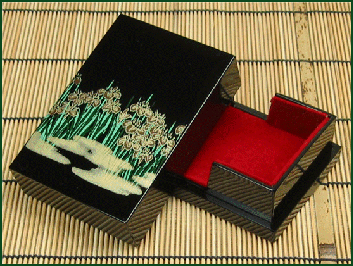
lacquer business card case People should be addressed by their titles and their family names plus an honorific (usually "san"). Using first names is considered presumptuous, too familiar and rude. Some young or Americanized Japanese are comfortable being addressed by their first names or an English nickname.
Common titles include “sensei” (teacher or professor), “oishasan” (doctor), “untenshusan” (taxi driver), “omawarisan” (policeman). Within companies people are often addressed by their titles — chairman, president, manager, section manager, supervisor, etc.”rather than name. The teacher Aya Nakamura is called Nakayamura-san (Ms. Nakamura) by her boss and Nakamura Sensei or Sensei by her students. Some of her friends might call her Aya-chan. "Chan" is a suffix usually used with the first names of children, good friends and sometimes with dogs or other pets.
Some companies have issued orders to their employees to stop addressing one another by their titles but to simply add the suffix -san to their names. In 2001, 59 percent of companies with 3,000 employees or more had adopted such a policy compared to 34 percent on 1995. One company president told the New York Times, “I think people will become more frank and free to talk thanks to this change. And it will show in our new ideas and products.”
Business Cards in Japan
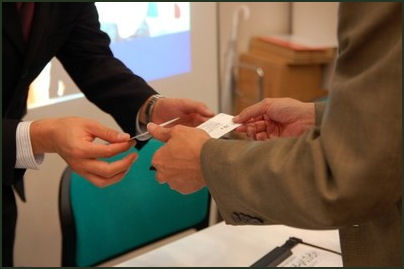
proper way to exchange business cards In the business world of Japan, it seems like everybody hands out business cards. Accept a business card with both hands with the writing face up, read it, nod and place it in your wallet. When you offer a business card briefly introduce yourself.
Exchanging business cards is a way of making an introduction. Try to have a business card printed in English on one side and Japanese on the other. Make sure it has your title on it. One reason why business cards are so important is they help define rank in Japan's vertical society.
A business card should be kept visible and treated with respect. It is considered rude to put a business card in your pocket without reading it first. To play with it or write on it is regarded as insulting. Don't write anything on the card.
Consensus Management and Risk in Japan
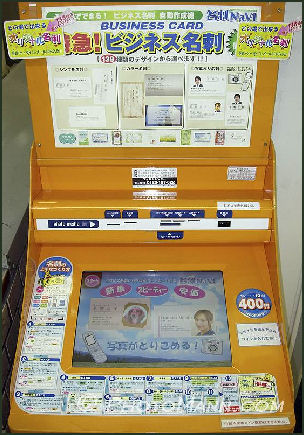
business card vending machine Even though Japanese companies have a hierarchal structure they often employ group think methods to solve problems.
One Japanese executive compared Japanese management to the portable shrines that are carried through the streets by 20 to 30 men during large festivals. "Managers only needed to sit on the portable shrines and have people carry them," he told the Washington Post.
Another executive said, "the weakest point of Japanese managers is they don’t have a clear expectation of their subordinates." Instead of giving an employee a problem and saying come up with a solution, a lot of time is spent in meetings going through the pluses and minuses of various options in a group think fashion and trying to make a decision through consensus.
Consensus-driven management style isn't responsive enough when quick, potentially painful decisions have to be made. Board meetings are scripted and management is held responsible for mistakes. In Japan you traditionally got promoted through seniority even if you didn't have real ability but that has changed somewhat in recent years.
On risk taking in Japan, Peter S. Goodman wrote in the New York Times, “Failure traditionally carries a deeper stigma in Japan than in the United States. It is “an enduring shame that limits the desire for risk, in the view of many of the nation’s cultural observers. This makes the Japanese far less comfortable with choices that increase the prospect of failure, even if they promise greater potential gains...Recent Japanese governments have sought to inculcate greater tolerance of failure...The Tokyo government even chartered an Association for the Study of Failure, which aimed to “turn failure experience into knowledge at the society, corporation and individual levels.”
Many Japanese executives have said the key to their success is their ability to listen to others and get along with everyone. They regard this as an essential leadership skill, more than being the smartest or the most skilled person.
Litigation and Settling Legal Disputes in Japan
The Japanese have traditionally shied away from litigation and look downed on legal contacts and formal written agreements. Few Japanese write wills, file lawsuits or consult lawyers concerning disputes (some prefer contacting local gangsters).
The Japanese way is to settle disputes privately and avoid public embarrassment. Courts often not expected to intervene in disputes between two parties as the parties are expected to work out their problems between themselves. Car accident claims are usually worked amicably with an arbitrator determining fault on a percentage basis and requiring the people involved and their insurance companies to pay accordingly.
"The concept of settlement by law is not as strong in Japan," one lawyer told the Washington Post. "In the past, people used to resort to someone in the community. The number of lawyers is not very large. So there is a tendency here to use yakuza."
Meeting Customs in Japan
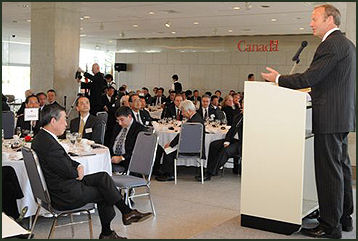
Canadian Prime Minister
speaks to Japanese business leaders For meeting and negotiations men should wear dark-colored suits and conservative ties; women should wear a suit in conservative color.
Japanese businessmen frequently shout "hai" at business meetings. American businessman first thought it meant "I agree." Now they know it basically means "I heard you."
The Japanese give a lot of attention to details and like to analyze things. They also like lots of diagrams and charts and pitches and documents delivered in Japanese rather than English.
At business meetings Japanese men sometimes close their eyes and look as if they are sleeping but actually are listening. Low level employees don't speak up unless they are spoken to.
Japanese are coy about speaking out at business meeting and in the office. One Ministry of Finance bureaucrat told the Washington Post, "Japanese people tend not to speak out face-to-face during the daytime. So to listen to what they really think, it is important to meet later and have really frank conversations over dinner."
Describing top executives at a meeting, Japanese culture expert Kate Elwood wrote in the Daily Yomiuri, Japanese businessmen often “sit quietly, noncommital, as various team members wrestle and wrangle with ideas. At times it seems they might even be dozing. And yet, as the end of the meeting draws near, they will speak up, summarizing the points made and fitting everything into a neat package that might be titled “the direction it appears best to take based on what everyone has said.”
Negotiating Customs in Japan

meeting room at
Tokyo Stock Exchange The Japanese way of negotiating traditionally has taken a long time and is more ritualized than the American and Western way of negotiating. Foreign businessmen often have to make several trips to Japan to establish a business relationship and set up a deal.
Japanese businessmen tend to engage in a lot of small talk and ask questions about you university and company before negotiating or talking business. This is done because establishing personal relations is important in business and jumping right into business is considered rude. Directness and complaining are also frowned upon.
It is a good idea to begin negotiation by praising the Japanese company you are negotiating with and focusing on the positive aspects of doing business together. Don't be too aggressive or pushy. Direct your pitch at the highest ranking person rather the one who speaks the best English. Avoid surprises, be patient, respect lucky and unlucky days and numbers and don't smile or laugh too much (in Japanese smiling can mean embarrassment).
Bring your own translators. They can be hired through major hotels and Japan Airlines.
Negotiation Strategies in Japan
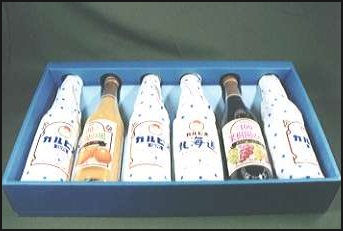
a nice gift Japanese Investment banker Noboru Yoshimuru told the New York Times that: 1) American tend to use information as a tool in negotiations to get information from other people in return while Japanese hide it to separate insiders from outsiders; 2) American tend to negotiate to win while Japan try to reach a point that is agreeable to both parties; 3) American tend to put their trust in numbers and logic while Japanese tend to put their trust in human relationships. [Source: New York Times magazine, June 8, 1997]
Yoshimuru said: "Japanese would probably buy my product if they felt I was trustworthy. American come somewhat the other way around. If I am strictly logical and persuasive, then Americans will accept my argument and start to trust me."
It is important in Japanese negotiation for the two parties to trust one another and not embarrass each other. Americans like to start negotiation at unreachable point and then bargain from there. In Japanese eyes, Americans positions are often embarrassing and humiliating and make them not want to negotiate.
Japanese often speak only terms ins of hopes and possibilities until negotiations and meetings are finished and a decision is reached through consensus. Until this process is complete nobody really knows what the outcome will be.
Business Entertaining in Japan
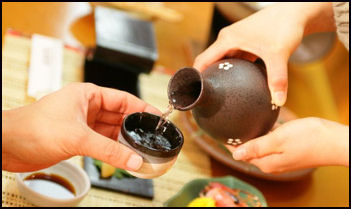
pouring a drink for others Entertaining is a big part of business in Japan. Japanese businessmen spend billions of dollars on tax exempt entertainment every year. Some executives attend business dinners for or five times a week with the cost per head often exceeding $500.
When business entertaining seems like the best way to conduct business, wait for Japanese contacts to invite you and don't feel obligated to pay them pack. Dinner invitations are the norm. Westerners are often taken to Western restaurants or ones that serve beef. If you go to a Japanese restaurant let your host order for you. Japanese business dinners tend to be men-only affairs with a lot of drinking. A visit to a karaoke or hostess bar (with women that flatter customers) is the norm after dinner is finished.
Wining and dining between executives and bankers can cost about $500 person at an exclusive restaurant and over $1,000 if a geisha and visits to hostess bars are thrown in.
The government began cracking down on wining and dining between banks and companies after two financial companies, thought to have been sound, went bankrupt as banks stood by and watched.
Many foreigners who work in Japan complain about the forced camaraderie. One non-Japanese told Kate Elwood in the Daily Yomiuri, “We don’t have time for this. We’re mercenaries. We’re here to do a job and get paid for it. We’re not here to make friends.
Peter Drucker and Japanese Baseball Book
The Economist reported in July 2010: “ZOFF, a maker of cheap, chic glasses in Tokyo’s trendy Harajuku district, is hardly a place you would expect to find dedicated followers of management theory. But one day its boss, 38-year-old Takeshi Ueno, came into a staff meeting waving a book about baseball with the picture of a gamine schoolgirl on the cover. It had the clunky title: “What if the Female Manager of a High-School Baseball Team read Drucker’s “Management”. Mr Ueno told his staff to read it. Satoko Osanai, his sales manager, did. [Source: The Economist, July 1 2010]
“Like many young businesswomen across Japan this year, Ms Osanai became an instant fan — not of baseball, but of the late management guru, Peter Drucker. After reading the book, she says, she started treating colleagues and customers differently. As news of the novel travelled from office to café to home, its sales topped 1m. According to the publisher, the cutesy manga cover was aimed more at attracting salarymen than women. Yet almost half of the buyers have been female. What’s more, sales for Drucker’s original works, such as “Management: Tasks, Responsibilities, Practices”, published in 1973, have soared. Some 300,000 copies of the book have sold in the past six months, compared with 100,000 copies in the previous 26 years.”
“The unlikely catalyst for this cultish enthusiasm is a fictional teenager called Minami. Like many high-school girls in Japan, she becomes the gofer for the baseball team’s male coach. Unlike many of her compatriots, she is the kind of girl, as the book says, who leaps before she looks. Horrified by the team’s lack of ambition, she sets it the goal of reaching the high-school championships. She stumbles upon Drucker’s 1973 book, and it helps her turn the rabble into a team.”
“Drucker’s advice to focus on clear and measurable goals has resonated deeply in a country where the most common management injunction is gambare, which loosely (and unhelpfully) means “push yourself”. Drucker, who loved Japan as much as he was confounded by it, would have been thrilled. A year before his death in 2005, he gave prophetic warning that Japanese firms might soon be overtaken by rivals from South Korea, China and India. He urged them to brace for competition by working out what they were good at, what they should not do and what their values were.”
“Not much of his advice has been heeded. Though some young outfits such as Zoff are razor-sharp, others remain corporate octopuses squeezing the life out of Japanese business. Women remain an underused asset: only 61 percent of them work, their average income is less than half that of men and they occupy barely 1 percent of boardroom seats. If Drucker, with the help of a headstrong teenager, can posthumously change that, it would be his greatest gift to Japan.”
Image Sources: 1) 6) Canada government 3) Goods from Japan 4) Japan ikuiku blog 5) Photomann. Doug Mann 7) Japan Vostor, 8) Japan Zone , japan-photo.de japan-photo.de ;
Text Sources: New York Times, Washington Post, Los Angeles Times, Daily Yomiuri, Times of London, Japan National Tourist Organization (JNTO), National Geographic, The New Yorker, Time, Newsweek, Reuters, AP, Lonely Planet Guides, Compton’s Encyclopedia and various books and other publications.
Last updated July 2011

